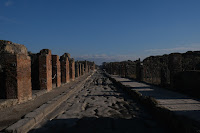Son and Spirit
When an angel informed Joseph that the child carried by Mary was “conceived of the Holy Spirit,” it indicated that something more than just a miraculous birth was about to unfold. From the beginning, the activity of the Spirit dominated the life of Jesus of Nazareth. He was “Jesus, the one called Christ,” that is, the “Anointed One,” the long-awaited Messiah of Israel.
Jesus was and remains the quintessential man of the Spirit. Neither his Messianic mission nor his present reign can be understood apart from the presence and activity of the Spirit of God in his life and ministry.
 |
| [Photo by Luke Vodell on Unsplash] |
That same Spirit sets his people apart for service to the Kingdom of God. Since his exaltation, Jesus has been the one who dispenses the Gift of the Spirit, empowering his Assembly to proclaim his reign and message of salvation to all the nations of the Earth.
In the Hebrew Bible, the verb rendered “anointed” is ‘mashakh’, meaning “smear, daub; to anoint” (Strong’s Concordance, #H4899). It is the word from which the corresponding English term ‘messiah’ is derived. The Greek noun used for it in the Septuagint Greek version of the Old Testament is ‘christos’ (Strong’s Concordance, #G5547).
The English term ‘Christ’ is the anglicized spelling of this Greek noun, ‘christos’. Both ‘mashakh’ and ‘christos’ denote someone or something that is “anointed” - (Leviticus 4:3, Daniel 9:25, Mathew 1:16).
Under the Levitical system, olive oil was used to “anoint” persons and things to separate them for sacred or royal service. In the Tabernacle, the altar, tent, table of showbread, and the vessels used in sacrificial rituals were all “anointed,” along with the priests, especially, the High Priest. Kings were anointed at their enthronement, which is why they were called “Yahweh’s Anointed” - (1 Samuel 12:3, 26:11, Psalm 2:2, 45:7).
A key messianic prophecy applied frequently to Jesus is from the Second Psalm - (e.g., Matthew 3:17, Hebrews 1:1-5, Revelation 12:5):
- (Psalm 2:1-9) – “The kings of the Earth take their station, and grave men have met by appointment together, against Yahweh and against HIS ANOINTED ONE… My Lord will mock at them: Then will he speak to them in his anger, and in his wrath confound them: Yet I have installed my king, on Zion my holy mountain. Let me tell of a decree, Yahweh has said to me: You are my son. This day, I have begotten you.
The Psalm concerns the ideal king of Israel who was destined to sit on David’s Throne forevermore. He was called “Yahweh’s anointed” in the Psalm, as well as “My King” and “My Son.”
THE SPIRIT
The Second Psalm is a prophecy about the “Anointed” King appointed by God to reign over the nations of the Earth from “Mount Zion.” However, unlike the historical kings and priests of Israel, He was anointed with God’s Spirit, not olive oil. The presence of the Spirit is what set him apart from all his predecessors and contemporaries.
All four gospel accounts record how the Spirit descended on Jesus following his baptism. In each account, his anointing was confirmed by a visual effect (“descended like a dove”) and an audible voice from Heaven (“This is my beloved Son, in whom I am well pleased” – Mark 1:1-9, John 1:32-34).
When the voice declared him to be “My beloved Son,” it echoed the clause in the Second Psalm, “You are My Son.” The descent of the Spirit meant he was “anointed” by God Himself for his mission as the Suffering Servant of Yahweh.
In the Old Testament, certain men were endowed temporarily by God’s Spirit. However, the Spirit descended and “REMAINED ON” Jesus. Moreover, he received the fullness of the Spirit, and “not by measure” - (John 3:34).
Following his baptism in the Jordan River, Jesus was driven “by the Spirit” into the wilderness where he was tested by the Devil. The Gospel of Luke records that after defeating Satan, “Jesus returned in the power of the Spirit.” Shortly thereafter, while preaching in a synagogue, he declared:
- “The Spirit of the Lord is upon me because HE ANOINTED ME to preach good tidings to the poor. He sent me to proclaim release to the captives, and recovering of sight to the blind, to set at liberty those who are bruised.” - (Luke 4:13-18).
Hence, it was the Spirit that equipped him for ministry, and he himself attributed his miracles and deeds to the Spirit of God. For example, when he was accused of exorcising demons “by the power of Satan,” he retorted, “But if I, by the Spirit of God, cast out demons” - (Matthew 12:28). This was also the understanding of Luke as he explained in the Book of Acts:
- (Acts 10:38) - “How GOD ANOINTED HIM with Holy Spirit and with power, who went about doing good and healing all that were oppressed by the adversary because God, was with him.”
The Spirit is integral to the identity, mission, and goal of the Messiah. Jesus is also the one who bestows the Spirit on his people, just as he promised to send the Spirit after his glorification:
- (John 7:37-39) – “If any man thirsts, let him come to me and drink. He that believes on me, just as said the Scripture, Rivers from within him shall flow of living water. NOW, THIS HE SPOKE CONCERNING THE SPIRIT WHICH THEY WHO BELIEVED ON HIM WERE ABOUT TO RECEIVE; for, not yet was the Spirit, because not yet was Jesus glorified” - (John 15:26).
 |
| [Photo by Arto Marttinen on Unsplash] |
After his Ascension, he “sent the Promise of his Father,” the Gift of the Spirit to his disciples, enabling them to proclaim the Gospel “to the uttermost ends of the Earth.” He had “received of the Father the Promise of the Holy Spirit.” As Paul wrote, “Having ascended on high, he led captivity captive, and gave gifts to men.”
Thus, the possession of the Spirit and the authority to distribute its gifts belong to Jesus. He now reigns over the nations and the “Kings of the Earth” from the Throne of David at the “right hand of the Majesty on High.” Not only is he the Messiah, but he also is the true Man of the Spirit.
RELATED POSTS:
- Yahweh Saves - (‘Jesus’ means ‘Yahweh saves.’ In the man from Nazareth, the salvation promised by the God of Israel arrived in all its glory)
- The Anointed Servant - (The Spirit of God and the voice from heaven confirmed the calling and identity of Jesus – the Son, Messiah, and the Servant of Yahweh)
- In Spirit and First - (At his baptism, the Spirit of God descended on Jesus, equipping him for his Messianic mission, the One who baptizes his followers in the Spirit)

